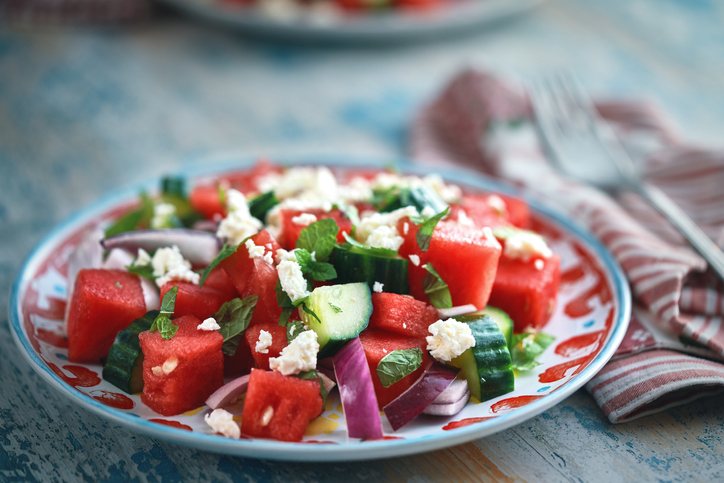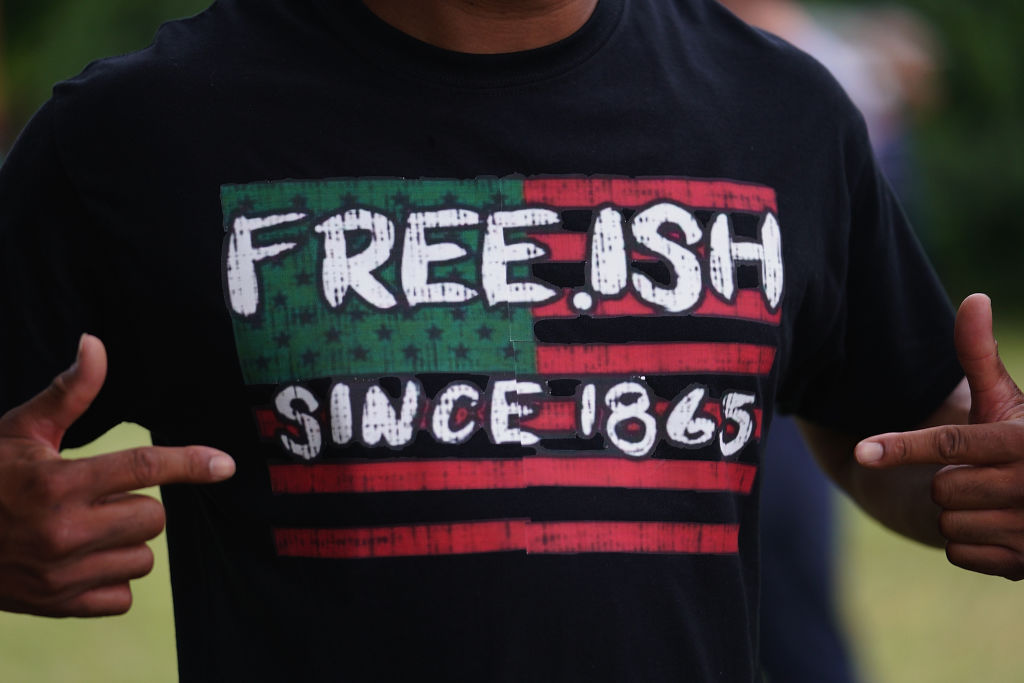
Source: GMVozd / Getty
An Indianapolis museum clearly learned nothing from the recent Walmart Juneteenth ice cream debacle. After advertising its Juneteenth menu, the museum found itself at the center of widespread controversy over the weekend.
The Children’s Museum of Indianapolis was gearing up to offer watermelon salad in the cafeteria for attendees in honor of their Juneteenth Jamboree celebration. The exhibition was created to spotlight the contributions of the African American community in Indianapolis, but unfortunately, the message was lost with the unsavory offering.
While not everyone may like watermelon salad, it’s a pretty common summertime dish. But labeling it Juneteenth Watermelon salad feeds into an old stereotype.
A firestorm of criticism broke out across social media after pictures of the salad began spreading across the internet. Many Twitter users slammed the institution for condoning racial stereotypes about the Black community, including Life Coach Clarence Mitchell.
“First the stupidity from Walmart and now the #Indianapolis Children’s Museum thought it was okay to have a watermelon salad to celebrate #Juneteenth,” she wrote, noting how the blunder was made almost a week after Walmart advertised their insensitive Juneteenth themed Ice cream.
“This is unbelievably insensitive and inappropriate,” she added.
First the stupidity from Walmart and now the #Indianapolis Children’s Museum thought it was okay to have a watermelon salad to celebrate #Juneteenth. This is unbelievably insensitive and inappropriate. pic.twitter.com/o3aaUcM3WI
— Clarene Mitchell (@MrsCMitch) June 5, 2022
While another user commented about how the disrespectful salad was “overpriced.”
People will play this down as a non-issue, but… why???
1) watermelon, along with fried chicken, have no black ties. They are stereotypes because, as finger foods, they look uncivilized to eat.
2) why did the Museum need to add “Juneteenth” to an overpriced salad?? https://t.co/4znA3fLSEU
— Fayzey (@illfayze) June 5, 2022
Initially, the museum tried to justify the eyebrow-raising decision by noting that there was a significant meaning behind eating red-colored foods in honor of the commemorative holiday that marked the end of slavery in the United States. A spokesperson from the museum told TMZ that the watermelon was representative of “the blood that was shed along the way to freedom.”
Celebrate #Juneteenth with us at the museum on Saturday, June 18!
Griot Drum Ensemble
Showcase of local artists
Tabletop activities
It’s included with museum admission: https://t.co/VHjzCySXBq pic.twitter.com/Z8mhYeTdvF
— The Children’s Museum (@TCMIndy) June 3, 2022
After the backlash, local news reported that the Children’s Museum removed the salad from their menu and issued a lengthy apology for the blatant error.
“We are currently reviewing how we may best convey these stories and traditions during this year’s Juneteenth celebration as well as making changes around how future food selections are made by our food service provider,” the museum explained.
Watermelon’s racist association with the Black Community emerged shortly after the Civil War when many formerly enslaved people grew and sold the fruit to support themselves financially. According to Boston Globe columnist Reneé Graham, white southerners were infuriated when Black people began to see success from their labor.
“It wasn’t long before grotesque caricatures of Black people with the same foods they used to empower themselves appeared on silverware, sheet music, and salt-and-pepper shakers,” she said.
The museum’s racist food menu comes almost two years after Ikea was slammed for selling fried chicken and watermelon on their Juneteenth-inspired food court menu. This food could very well be a part of Juneteenth celebrations.
But non-Black led entities simply putting out these offerings without any historical context is a part of the problem. Establishments trying to “celebrate” Juneteenth would be wise to work with Black chefs and organizers who understand the sociohistorical context for the dishes prepared.
Efforts like Nicole A. Taylor’s new cookbook “Watermelon and Red Birds” not only share Juneteenth-inspired recipes but provide culture and context. In an interview with Civil Eats, Taylor said she wanted non-Black people to do more than simply use the recipes.
“I also want them to use this cookbook as an opportunity to honor Black culture and Black history and to understand where we fit in the American story of freedom,” Taylor said.
SEE ALSO:
window.addEventListener(‘interaction’, function () {
setTimeout(function () {
var s = document.createElement(‘script’), el = document.getElementsByTagName(‘script’)[ 0 ];
s.async = true;
s.src = ‘https://platform.twitter.com/widgets.js’;
el.parentNode.insertBefore(s, el);
}, 1000)
});

